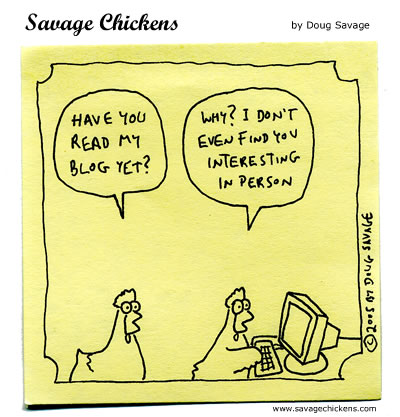
Listening to lectures on sonic foundry can occasionally make me feel like a deranged hermit. I spend days alone at my apartment and venture down to interact with society only for small group discussions, the occasional DES session or a trip to IGA. The atmosphere is distraction free, which I think has made me more efficient and productive this semester (we'll see about that after midterms). The ability to set ones schedule and actually stay awake through lecture has certainly made my med school experience a lot less stressful, but it's not without its frustrations.
Listening to the Immunology lecture just the other day, our Prof. discussed the polymorphism of MHC and the various alleles for each MHC locus within the population. She then asked a simple question: how does this benefit us from an evolutionary perspective. Now, I know Sonic can be misleading but I could hear the crickets. One person ventured a guess but missed the point. Meanwhile, I immediately thought of biodiversity and the lessons I learned from my Evolution class in undergrad - one of those "I'm a biology major, not a pre-med major" classes that I took before deciding to go into medicine. So, I am sitting here screaming duh people, if you don't have a diverse recognition of antigen then a single microbe that goes unrecognized by the entire population can wipe out the whole species! The genetic bottleneck is a big problem in conservation biology. And yes, evolution applies to humans too - even more as we think.
Evolution is often a lost part of medical education. We learn a great deal about the immediate causes of a disease, or even how one can become susceptible, but we are generally not trained in the "why do we get atherosclerosis in the first place?" kind of questions. This piece in Aetiology discusses the med student mentality:
If basic biology and traditional medicine make up the plot of our disease "stories", evolutionary medicine would be somewhat like the moral. My roommate is a medical student and when asked, she can tell you how just about anything in the human body works and what is happening when things go wrong. When asked why things go wrong, her answer will refer to a proximate cause, such as certain foods leading to plaque build up which can lead to heart disease. If the question of why is rephrased, as in why does the disease even exist at all, then she's stumped. This is the question considered by evolutionary medicine. Why aren't our bodies able to repair clogged arteries? Why are we prone to infections? Why are our bodies so good at some things but so inept at others?
The post goes on to discuss the book "Why We Get Sick: The New Science of Evolutionary Medicine". Especially relevant to my fellow immunology students is the following example discussed later in the same post:
So if infections are one evolutionary explanation for disease, what's an example? I recently came across an interesting article about infection and it's relation to premenstrual syndrome. In the article Premenstrual Syndrome: an evolutionary perspective on its causes and treatment, Doyle et al. propose premenstrual syndrome is due to an exacerbation of a set of infectious diseases during cyclic changes of immunosuppression by estrogen and progesterone. While genetics and non-infectious environmental influences have been examined and found largely unable to explain PMS, infectious causes have been overlooked. However, it is know how immune function varies throughout the menstrual cycle in such a way that there could be less effective control of fungi, viruses, and intracellular bacteria, so making the leap to a persistent infection contributing to PMS doesn't seem too difficult. Supporting this hypothesis is a long list of chronic diseases with suspected infectious causes that are exacerbated premenstrually including Crohn's disease with Mycobacterium avium and juvenile onset OCD with Streptococcus pyogenes.
It's a really fascinating interplay between immunology, environment, and genetics. You can also consider the influence of epigenetics for good measure and I'm sure your head will start to spin! The book looks like a good read and hopefully something we'll see in the medical school curriculum of the future. Anyone out there read this book or ones like it?


